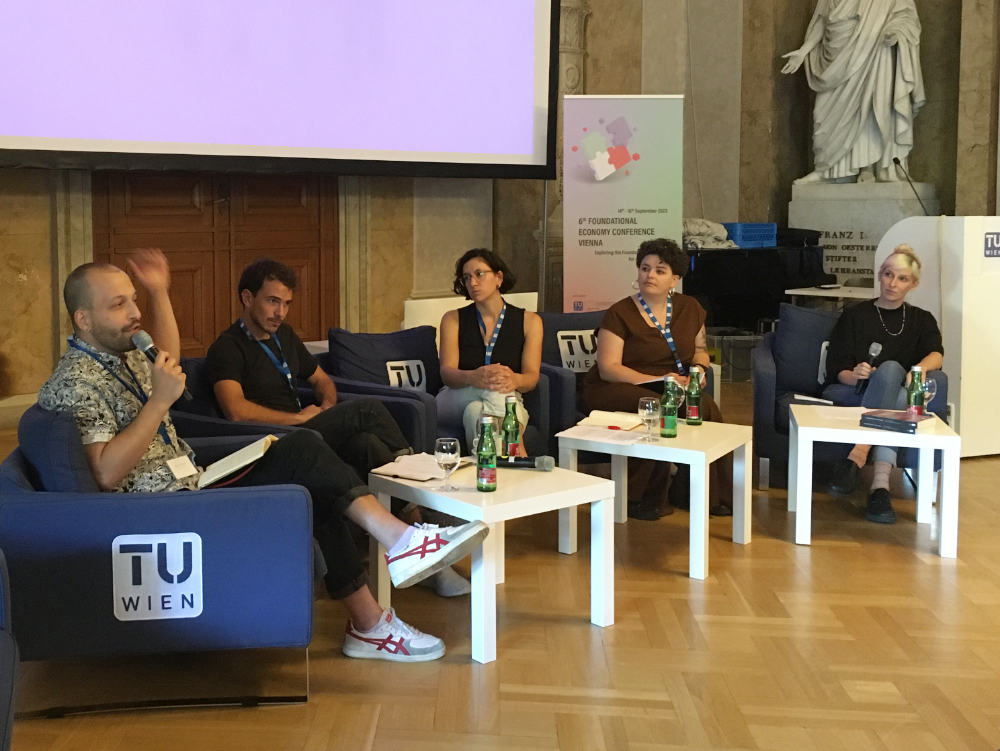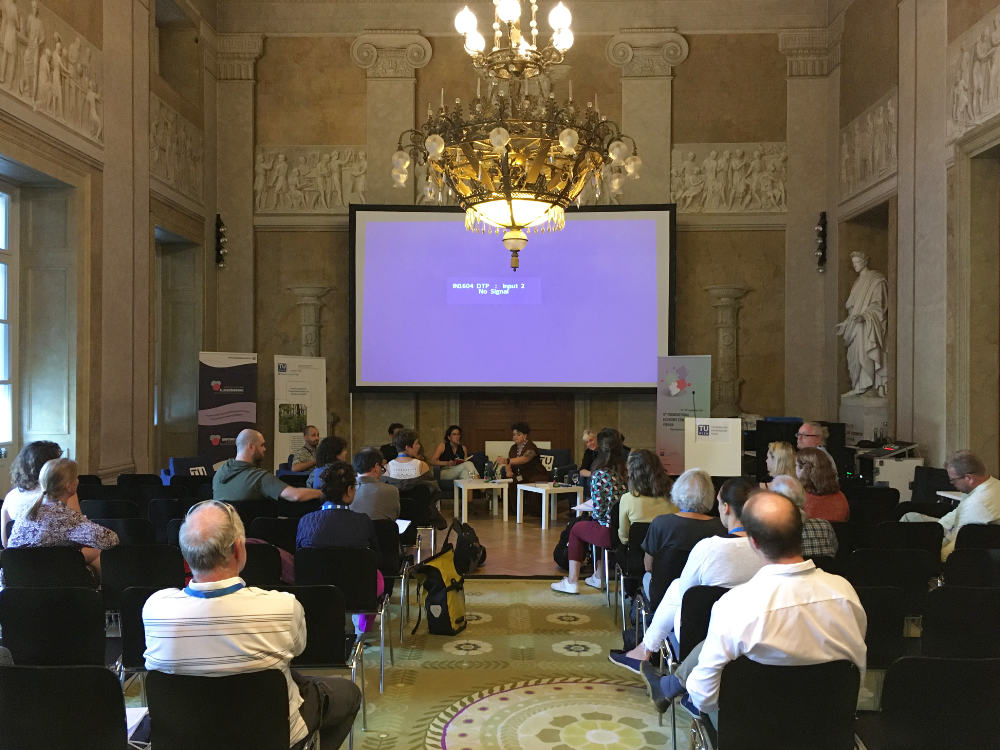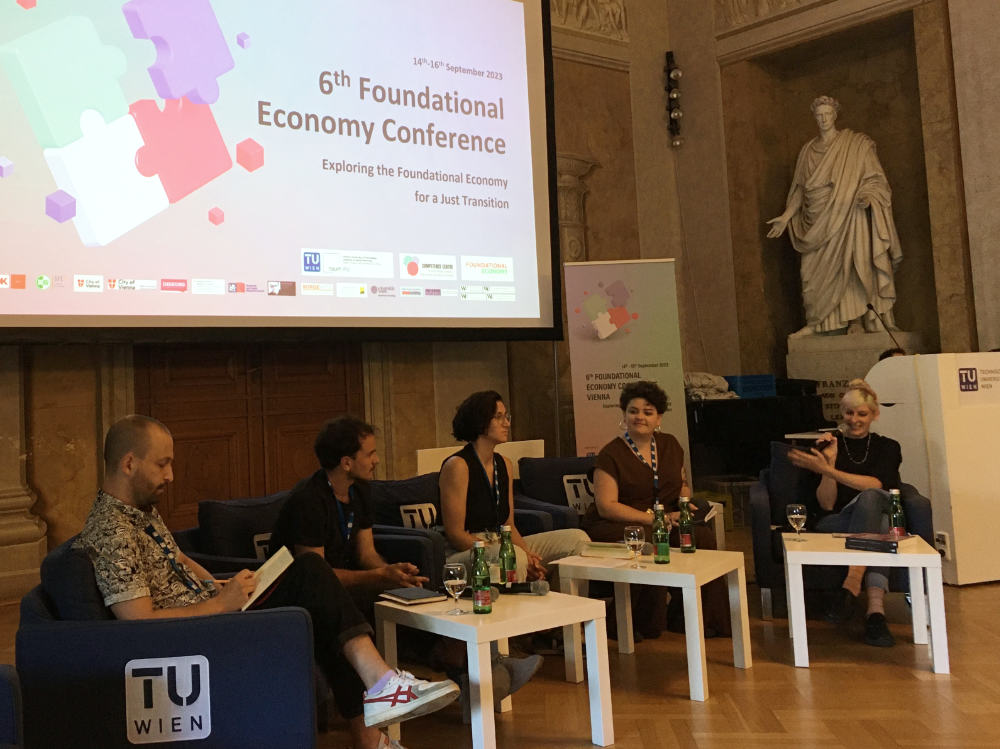Where do Degrowth and the Foundational Economy overlap? Why is a process of democratising our provisioning system like energy or housing relevant for a social ecolocial transformation? And what are the blind spots in these discussions?
Degrowth Vienna brought together actors from different fields to share their perspectives on these questions, to discuss and to exchange with the audience at the 8th Foundational Economy Conference, which took place from 14 to 16 September in Vienna. Speakers were Max Hollweg (Attac Austria), Michaela Neumann (Arbeiterkammer Wien), Sina Reisch (Konzeptwerk Neue Ökonomie) and Gabriel Trettel Silva (Modul University); moderated by Lisette von Maltzahn (Degrowth Vienna).
The multiple crises we face require a social-ecological transformation of our societies. To ensure a good life for all within planetary boundaries, degrowth proposes a radical downscaling of production and consumption and a restructuring of socio-economic systems towards human well-being and ecological stability. Productive capacities should be redirected to activities that serve the well-being of people and the environment. Much of this lies within the foundation economy, the part of the economy that is delivering goods, services and infrastructures that are needed for everyday life. In contrast to Green Growth strategies – focusing on efficiency improvements through technological innovations – degrowth advocates for a transformation of socio-economic systems away from profit orientation and international competition – towards an organization of socio-economic systems around human well being and ecological stability.
Therefore we need a foundational economy that is de-commodified, made accessible for all and democratically organized.
The panel took a closer look at the opportunities that this focus on a democratized foundational economy has – but also at the challenges and open questions that arise when it comes to achieving the absolutely necessary drastic reduction of material and energy consumption.
„Everyone should have affordable and good access to energy, but of course we have to stay within planetary boundaries.“
In general, the speakers agreed that democratising basic services for all people is an important step towards social-ecological transformation and a good life for all. Max Hollweg, who is currently leading the campaign ‚Democratise Energy Supply‚ at Attac Austria, pointed out: „The energy sector is one of the core sectors that provide the infrastructure for well-being. So everyone should have affordable and good access to energy, but of course we have to stay within planetary boundaries“. He made it clear that there are different ways to democratise the energy system, and that it requires different responses and strategies to different existing structures: “Talking about public ownership it is often referred as state owned by people. But we can see in Austria that that’s not the solution. Many state-owned energy companies here are organised like private companies with the aim of increasing the shareholders profits“. So public ownership alone is not the answer, there also needs to be a redistribution of power. According to Max, this could be achieved through the formation of councils that bring together different actors such as civil society, scientists and experts to analyse and discuss the current situation, develop visions, form alliances and create a pathway for change and eventually a legal framework.


Sina Reisch, climate activist and member of Konzeptwerk Neue Ökonomie, emphasises that the goal of „Vergesellschaftung“ with a democratising process must be intertwined with social and ecological aspects: „We have to be realistic: democratic control alone does not mean that it will be ecological and anti-colonial“. Therefore, social and climate justice must always combine the local with a global perspective. The aim, as Sina explains, was to expropriate large, powerful corporations, such as those in the fossil fuel sector, and to create structures of public ownership. After all, „climate justice is not possible if private property is in the hands of a few“.
„We have very strong colonial assumptions in the back of our minds and we need to scrutinise and read them.“
Gabriel Trettel Silva, PhD candidate at Modul University Vienna, researches trade, imperialism and coloniality, and unequal economic exchange. He brings key points to the discussion, looking at colonial and imperial structures and questioning what imperial structures underpin the discussion of basic needs provision in the Global North. „We have very strong colonial assumptions in the back of our minds and we need to scrutinise and read them. Then we can clear the space and really start building alternatives beyond colonial ideas.“ He illustrates how the proposed energy transition in the Global North is reinforcing colonial and exploitative structures through its dependency on rare minerals from the Global South. In general, he supports the democratisation of basic services in the global North, but „we are building on colonial and exploitative structures in the global supply chain… We have to ask ourselves: How do we stop colonial and imperial processes in these places?“
This question applies not only to raw materials, but also to the labour market. It is the workers who provide our basic needs, as Michaela Neumann, a referent in the labour market policy and integration department of the Viennese Chamber of Labour, points out. „We need to talk about working conditions, pay, working hours and how people can make the transformation of our economy a reality“. And, of course, the global perspective of the labour market must be taken into account: „The Global South is being used as a buffer for labour,“ she points out, as we can see, for example, with people from the Philippines being recruited by the Austrian government to address the shortage of skilled care workers. To counteract these structures, policy measures are needed to improve working conditions in Austria, for example in the care sector, retraining opportunities with financial compensation, and subsidies that promote the welfare of society rather than private profits.
Last but not least, in addition to political measures, we also need the support of society. How can we make the social ecological transformation attractive to the public?
„We need to organise, communicate and create narratives that can reach the public and society,“ Sina emphasizes. These narratives must create positive visions of the future and reach people on an emotional level, says Michaela Neumann. Because everyone can benefit: “We have to show, what people can actually gain with this kind of policies of basic provisioning. How they can get out of energy poverty, how they can have good health care and care for their children, how they can spend their leisure time in nature, and how they can have good and cheap access to mobility.
We thank our panelists and the organizers of the Foundational Economy Conference and look forward to further exciting discussions on these topics!

